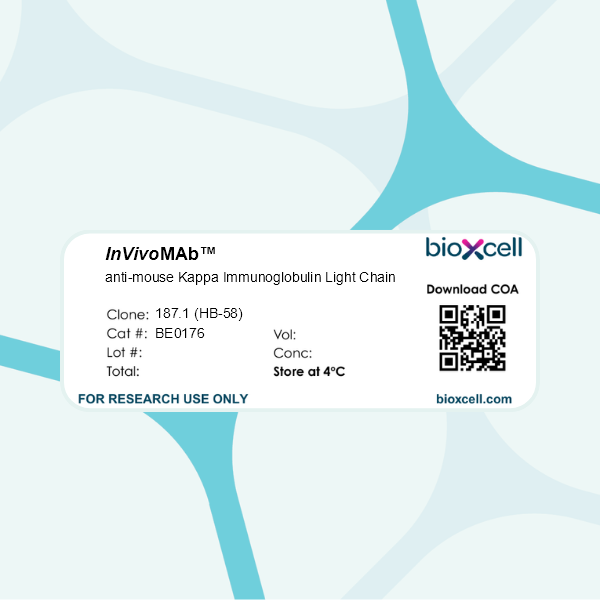InVivoMAb anti-mouse Kappa Immunoglobulin Light Chain
Product Description
Specifications
| Isotype | Rat IgG1, κ |
|---|---|
| Recommended Isotype Control(s) | InVivoMAb rat IgG1 isotype control, anti-horseradish peroxidase |
| Recommended Dilution Buffer | InVivoPure pH 7.0 Dilution Buffer |
| Conjugation | This product is unconjugated. Conjugation is available via our Antibody Conjugation Services. |
| Immunogen | Mouse IgG2b Isotype control antibody clone MPC-11 |
| Reported Applications | Immunofluorescence |
| Formulation |
PBS, pH 7.0 Contains no stabilizers or preservatives |
| Endotoxin |
≤1EU/mg (≤0.001EU/μg) Determined by LAL assay |
| Purity |
≥95% Determined by SDS-PAGE |
| Sterility | 0.2 µm filtration |
| Production | Purified from cell culture supernatant in an animal-free facility |
| Purification | Protein G |
| RRID | AB_10948999 |
| Molecular Weight | 150 kDa |
| Storage | The antibody solution should be stored at the stock concentration at 4°C. Do not freeze. |
| Need a Custom Formulation? | See All Antibody Customization Options |
Application References
Immunofluorescence
Burbage, M., et al (2015). "Cdc42 is a key regulator of B cell differentiation and is required for antiviral humoral immunity" J Exp Med 212(1): 53-72.
PubMed
The small Rho GTPase Cdc42, known to interact with Wiskott-Aldrich syndrome (WAS) protein, is an important regulator of actin remodeling. Here, we show that genetic ablation of Cdc42 exclusively in the B cell lineage is sufficient to render mice unable to mount antibody responses. Indeed Cdc42-deficient mice are incapable of forming germinal centers or generating plasma B cells upon either viral infection or immunization. Such severe immune deficiency is caused by multiple and profound B cell abnormalities, including early blocks during B cell development; impaired antigen-driven BCR signaling and actin remodeling; defective antigen presentation and in vivo interaction with T cells; and a severe B cell-intrinsic block in plasma cell differentiation. Thus, our study presents a new perspective on Cdc42 as key regulator of B cell physiology.

